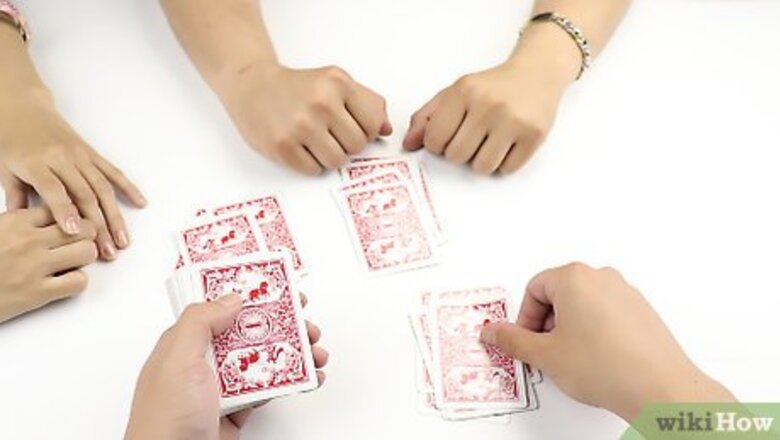
views
X
Research source
No matter what you call the game, you’ll only need a standard deck of 52 cards to play with a group of five or less, and you can easily include more players by adding a second deck.[2]
X
Research source
Ready to have some fun? We’ll teach you exactly how to play and walk you through all the rules you need to know, plus strategies to win every time.
- The basic gameplay of Crazy Eights involves trying to get rid of your cards by matching either the rank or suit of the face-up card in the discard pile.
- The objective of the game is to be the first one to discard all your cards. Or, if you’re playing multiple rounds, you want to have the fewest points.
- You can play variations by assigning different actions to cards, increasing the number of starting cards, and more.
Setup
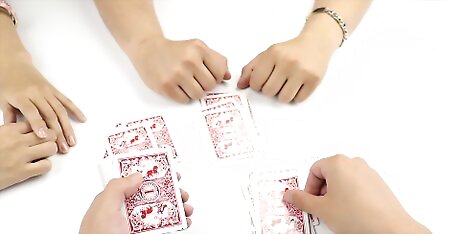
Shuffle and deal 8 cards to each player. Take a normal 52-card deck and thoroughly shuffle it. One card at a time, deal cards to players starting with the player on your left. In Crazy Eights (and, generally, in most card games), cards are always dealt starting with the player to the left of the dealer. If there are only two players total, only deal 7 cards instead of the usual 8. As mentioned earlier, if there are more than 5 players, combine 2 decks together.
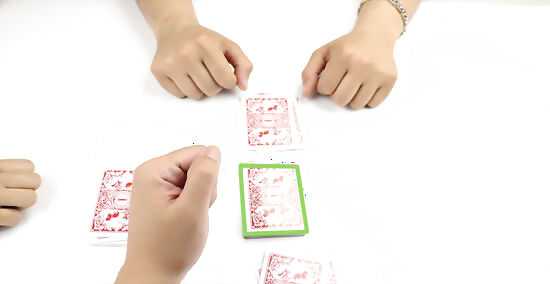
Place the remaining cards in the center. When each player has 8 cards, set the remaining cards face down in the center of the playing area. These cards form the draw pile. If you can’t play a card, you’ll draw from these cards until you get a playable one.
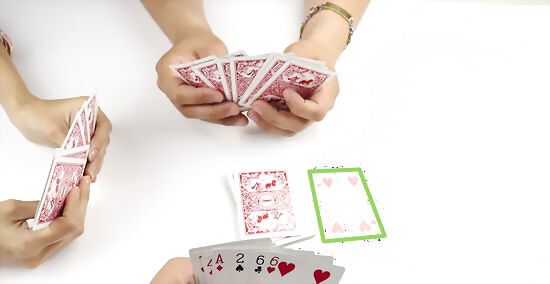
Turn a draw pile card face-up to form the discard pile. When you finish dealing, turn over the top card in the draw pile and set it beside the draw cards. This will become the discard pile. If an 8 starts off the draw pile, reshuffle and flip over a new starting card.
How to Play
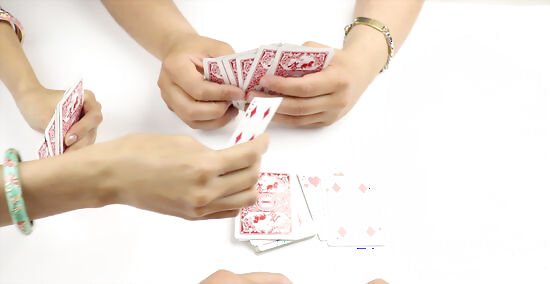
Match rank or suit with the top card to get rid of one of your cards. To play a card, players must either match the rank (4, 10, K, A…) or suit (♣,♦,♥,♠) with a single card in their hand. This card is placed face-up on top of the discard pile and the turn passes to the next player on the left. In most standard card games, including Crazy Eights, the player to left of the dealer is the first to play a card after the cards are dealt. 8s are wild cards in this game. When you play an 8, you'll have to declare the new suit. Some versions of Crazy Eights restrict players from ending on an 8.
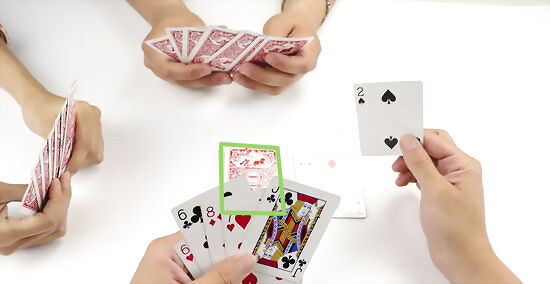
Draw cards if you have no playable cards in your hand. If you don't have any cards in your hand that match the rank or suit of the top card, draw cards from the draw pile until you get a playable card. After that, play the card and then continue as normal. Some players only allow one card to be drawn per turn. Draw rules are often determined according to player preferences.
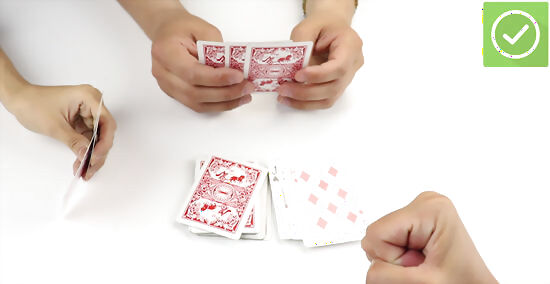
Play cards one at a time until a player has none left. Once the player to the left of the dealer has played a single card, the next player to the left goes. In this fashion, players discard (or draw until they can discard) a single card at a time. The hand ends when a player has no more cards in their hand. If you’re playing one round, the person who discarded their cards first is the winner! If you’re playing multiple hands, move on to the winning and scoring section below.
Winning & Scoring

Count points to decide the winner if the draw pile runs out. It’s possible that the draw pile will run out before the game is finished. This is a game-ending condition in Crazy Eights. The player with the fewest points (not necessarily cards) in their hand wins. Aces are worth 1 point. Numbered cards are worth the same amount as their number of pips. Court cards (J, Q, K) are worth 10 points apiece. 8s really are crazy with a value of 50 points! The winning player in this situation receives a winning score equal to the difference between their hand’s score and every other player’s hand score.
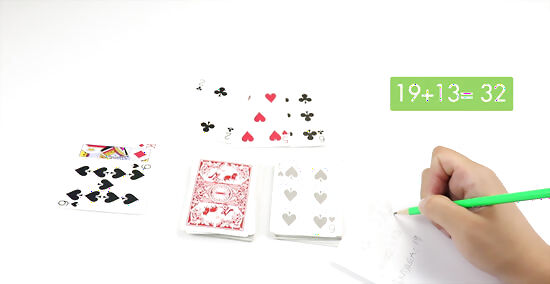
Calculate the score for the hand and continue playing. When a player runs out of cards, the hand is over. Each player should figure out the point score of the cards left in their hand. The winner of the hand adds the ending point total for each player to their score. Keep in mind that numbered cards (including aces) = the number of pips, court cards = 10, and 8s = 50 points.
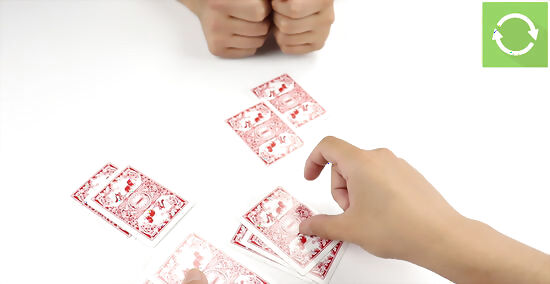
Shuffle the cards and play until a player matches or beats the point goal. The point goal for the game is determined by the number of players. Cards are reshuffled after each hand and the game continues until a player reaches or exceeds: 100 points (2 players) 150 points (3 players) 200 points (4 players) 250 points (5 players) And so on...
Simple Variations

Increase the number of cards in the starting hand. The more cards in your starting hand, the longer the game will go on. However, doing this will decrease your draw pile, which could have the opposite effect and shorten your game. Because of this, you may want to play with two decks combined. When adding more cards to your Crazy Eights deck, choose cards with the same design to prevent card counting. Add your second deck to the first by shuffling the cards together as you would normally. Take your time - since there are more cards, it can be difficult to shuffle.
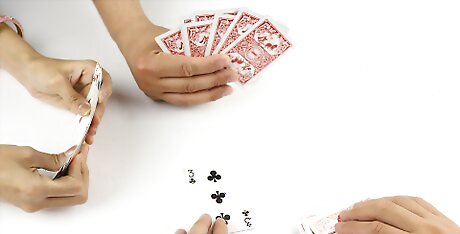
Assign crazy actions to certain cards. This addition to the game really captures its wild and wacky flavor. Your imagination is the limit, but as an example, you might explain at the beginning of the game that if a 3 is played, the player has to run around the table three times.

Have players indicate when they’re on their last card. Similar to Uno, with this rule players have to announce when they are on their last card. This gives other players a chance to be more strategic with how they play. Some players might consider this a standard rule. Oftentimes, this rule comes with a penalty: if you don’t announce your last card, you must draw two cards.
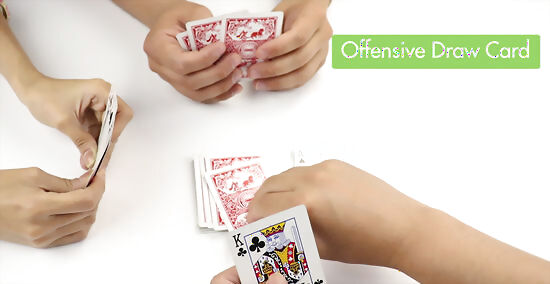
Determine an offensive draw card or cards. These can be used to “attack” the player after you by making that player draw cards. For example, playing an ace forces a one card draw or playing a 2 forces a two card draw. Offensive cards can be used to force players with only one card left to draw more, preventing them from winning.

Designate a blocker card to combat draw cards. Offensive draw cards can sometimes get out of hand, especially if one player has many in their hand. Blocker cards can level the playing field. Play blocker cards after a draw card to cancel the effect of the draw card. 10s and Jacks work well as blocker cards. This way, it’s somewhat risky to hold onto these cards, because if you get stuck with one at the end, it’ll be worth 10 points against you.
Zimbabwean Crazy Eights

Recognize the different aspects of this version of Crazy Eights. All the normal rules of Crazy Eights hold for this Zimbabwean version. The big difference is that other cards besides 8s have special abilities too. These special abilities of cards are broken up into three categories: offensive, shifting, and defensive.
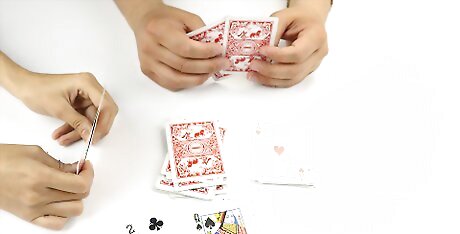
Explain offensive cards to players. Offensive cards cause the next player to draw a certain number of cards, making it more difficult for them to win. Playing a 2 causes the next player to draw two cards. Playing the Queen of Spades causes the next player to draw five. Some players allow forced draws to skip a person if an offensive card is played on top of an offensive card. So if a 2 were played, the next player could lay another 2, passing a four-card draw down the line.
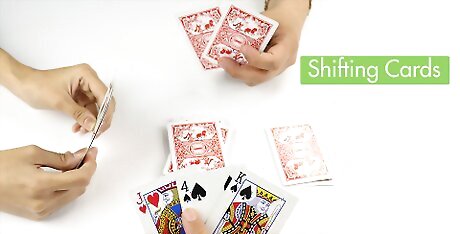
List and describe shifting cards. Shifting cards change the order in which cards are played. There are three main shifting cards: 4s, Jacks, and Kings. 4s reverse the direction of play from left to right or vice versa. Jacks skip the next player’s turn. Kings allow you to continue your turn and play two cards. If the direction of play is normal, it's always to the left. Playing a 4 reverses this direction until another 4 gets played. If a player skipped by a Jack also has a Jack, some rules allow the skipped player to use it. This results in two players being skipped - or more, depending on how many Jacks are played. Kings allow you to shed two cards in one turn. Some players insist that the card following the King must be the same suit, others allow any card to follow the King.

Point out the importance of aces for defense. Aces are the only defensive card in this Zimbabwean version of Crazy Eights. When an offensive card is played, the next player can play any ace to cancel out the effect of the forced draw.


















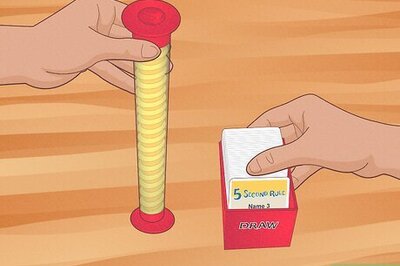
Comments
0 comment